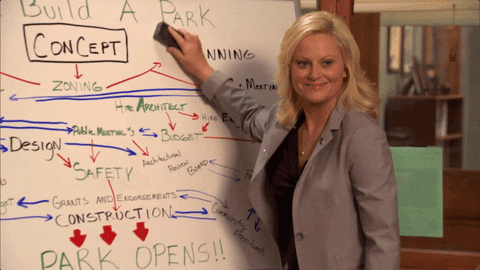On Grit
in which the sharing of one's humiliating undercrackers can be a powerful tool for personal growth
I’m forty thousand words into the first draft of a novel. It’s a sort of psychological thriller, set in a psychedelic psychotherapy retreat in Wollongong, and it features an orgasm clinic, a monkey attack and a character obsessed with compost. As I write a scene where men huddle together in the cold-plunge bathhouse playing a game called Piccolo Diccolo that aims to to erase the Shame Stain, I find myself wondering (and not for the first time) is this all … a bit… too much?
The short answer: yes. I have no idea what I am doing. I’ve been tinkering at this novel - Bleach Church - for a long time and at this point, I’m about a quarter through my complex outline. Which is to say that at my current rate this book will be the size of a Bible. And just as sexy.
But the job of writing, I’ve come to believe, is to sit in this messy middle, this somewhat humiliating, ridiculous place, where the plot is mad, the words are terrible, and the work is of poor quality on every metric that examines literature.
All righty then! Keep at it, shall I?
Many years ago, Keith and I both started to write a hobby-novel at night. For me, it was like drawing blood from a stone. The further I waded into my story, the more miserable I became at my own ineptitude. Worse, Keith occasionally giggled as he typed madly. He was not only producing words, but producing words that made him happy. I remember the name of one of his chapters: Sex At Last! With exclamation point. Genius. Sigh.
I gave up. But I found that manuscript years later, and what shocked me on rereading it was that it had something. There was life there: a few jokes that landed, a plot with good bones, even though there was much to be fixed. But at the time, I was not capable of sitting with first-draft inadequacy. I really had internalised the notion of ‘genius’ being at the heart of the endeavour, somehow.
I while later, I had started working harder to sit with all of that. I wrote about it for the ABC.
I’m writing at a café located at the mid-point of a seven kilometre loop around my house, a route that includes some juicy hills, and after completing the first half, I’m a bit of a sweaty wreck. I have a plan, you see, to walk the Camino De Santiago next year. This ancient pilgrim trail across Spain requires walking about twenty kilometres a day for five weeks, and its an adventure way out of my comfort zone, which is, to be honest, comfort. My active wear is sub-par, I’m a lover of the couch and a proud sporter of a protuberance the children call (with great affection) Pillow Tummy.
Nevertheless, here I am at the Fireworks Café, rosy-cheeked as Miss Piggy and fishing the strap of my cheap sports bra out of my sleeve. (Sensual.) I haul my laptop out of my backpack, order a flat white, and start tinkering with my ‘France’ manuscript. As I wrestle order out of my wild mess of notes, every once in a while I add a random thought to the ‘Camino/Convict’ manuscript (embryonic) and the ‘Baby’ manuscript (completed to third-draft stage). Not one of these books is commissioned, comrades. I am Imposter Syndrome writ large. But nonetheless, I beaver away, happy as…well, Miss Piggy.
In the end, the Fireworks Café closed down and the Camino plan was pandemic-tanked (my 50th spent instead in a socially-distanced circle of girlfriends at the local park where we sat on yoga mats to meet the ‘exercise’ rule and drank gin from water bottles) . That long hike across Spain has now become a mother/daughter dream. But two of the books I described in that piece have been picked up by publishers, and there are three more in various stages of marination. I got there partly because I had become interested in the notion of ‘grit’, a trait seen as a marker for success in creativity, sports and business.
Grit is critical, but we don’t like the idea of it, researchers say. We prefer the notion of ‘genius’ because it lets us off the hook, allowing us to see a person as incredible at their skill because of their magical, innate talent. The practice hours - the discarded novel drafts, the time following a black line at the bottom of a pool, the useless theories tested before the mathematical algorithm is cracked – are invisible once we are presented with the finished novel, the medal-winning 800 metre freestyle performance or the completed, elegant theory.
All these successes require many hundreds of hours of what psychology professor Anders Eriksson calls ‘deliberate practice’, or the beavering away at a goal with an end-point in mind. Passion is important, but perseverance is the key to reaching proficiency, and even -if you’re lucky – ‘genius’. The painful sitting with one’s own inadequacies is also necessary. In my case, that includes an ill-fitting sports bra and three unsold manuscripts.
Experts say that grit can be learned, like any skill. It’s in the interest of installing some grit into my flabby character that I have been plugging away at these books and hauling poor Pillow Tummy up and down those hideous hills. Just maybe, if I put in the work, I can transform these manuscripts into polished, successful products. Grit into gold. At least I will have tried, an effort that is valuable, in and of itself.
I heard George Saunders speak about writing fiction recently, and I loved his framing:
Your story is perfect somewhere - like, in your subconscious it’s a beautiful sheet of glass. So beautiful. Then, in trying to tell it, you drop it. It hits the ground and it shatters. Now, revising is the process of putting it back together. So that means you will have to be really patient.
I also love the idea of a story building over time: the bones, the muscles, the connective tissue, the layers of fat and finally, the skin that wraps the whole; the final layer where the sentence-level tinkering lives. Where we try to ‘make the beast beautiful’, as the Chinese proverb has it. Patience, grasshoppers.
The thing is, the long-form, incremental growth over time, this is the part that makes us human. Fail again. Fail better. Vulnerability is so much more interesting than perfection, or magical success. We’ve got AI for that. And Scandinavian people.
In our shiny online worlds, anything can be made to appear perfect with a little face-tuning and some judicious clipping of the shabby corners. But we are all craving the connection that vulnerability brings, and we all dread embarrassment – the most anxiety-provoking emotional experience of them all. Allowing oneself to be seen in the raw, fraudish early reality of a project; ugly, moronic working-out on full display, is like arriving at the ball scaffolded into your tummy-sucking support undergarments without your frock on top. It’s an act of anarchy. And of humanity.
There has been pushback against the idea of ‘grit’. Some think it denies systemic privilege, others argue that, conceptually, pushing for ‘purpose’ or ‘passion’ is more useful. But for me, focusing on the skill of persistence in the face of inadequacy was key for my own writing practice. Apply bum glue. Turn off critic mode. Approach the page.
Let me know if you are interested in more newsletters about writing, comrades.
May your week ahead be full of gritty goodness, and the chance to push your way through all the awkward, embarrassing clunkiness to some wild, unexpected, rich seam of meaning. Just like Fonzie when, at the end of a dance marathon, he dug deep and found the Cossack stallion within.
Listening
Hilarious romp of a podcast The Glitch. Hard recommend. I’ve also adored Believe in Magic and Ghost Story. For a great example of vulnerability, listen to the episode Day 7 of Armchair Anonymous, where host Dax Shepard cops to an addiction relapse and talks through the details with his co-host.
Reading
Spare and lovely, like all her work, I loved One Hundred Days by Alice Pung recently, as well as Heartbake by Charlotte Ree. I’m also in an Adam Grant moment (his podcast episode How To Love Criticism is a great starting point) and reading his new book Hidden Potential.
Out loud, my 15 y/old Biggles reads me Wikipedia articles on geopolitics. I try to limit the side-quests of this child’s brain, so they are written up on the pantry for a future time. Currently, our Wiki to-read list says: Myanmar civil war, Saudi Aramco, Pinochet, the Bounty munity and the East India Company.
Prepare for all of this, comrades, and more, in the next newsletter!







Love everything you write, especially when you write about writing. Charlotte Wood has a chapter titled: “The Grit and the Gift” in The Luminous Solution and I think of that word often as I write my dismal first draft (slowly, so slowly). Keep going, Rach! And try to enjoy it (this is what I keep telling myself) x
Great article Rach. I love your reflections x